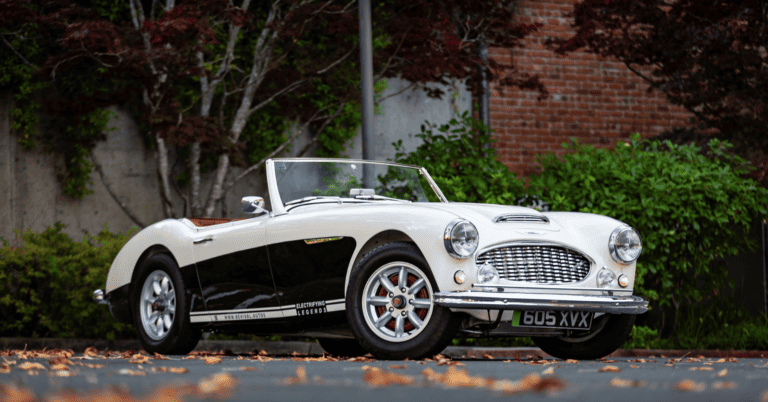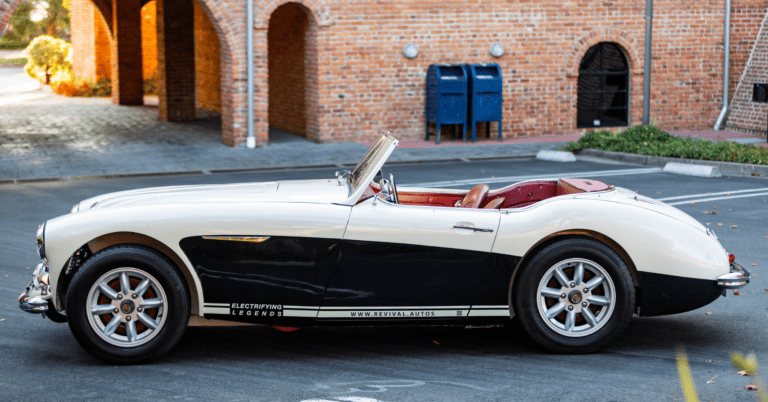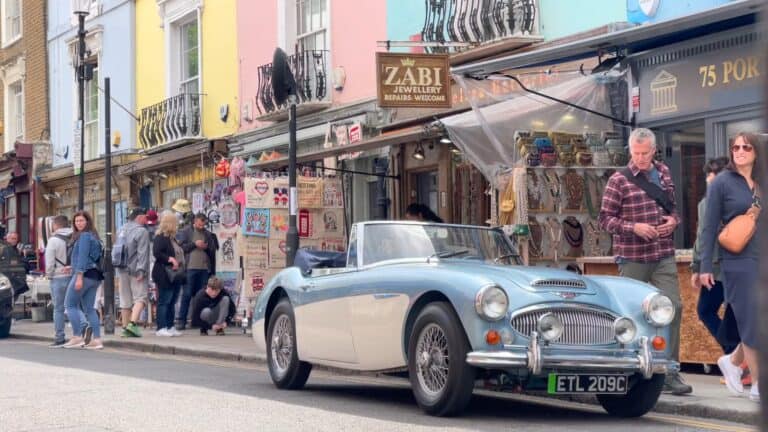In the dynamic realm of automotive aficionados and collectors, a fresh contender has gracefully emerged—the electric classic car. This entrancing fusion of vintage automotive elegance with contemporary electric powertrains has carved out a niche, drawing the spotlight and stimulating discussions. Nevertheless, prior to embarking on the path of owning an electric classic car, it is crucial to engage in a comprehensive cost analysis, shedding light on the financial implications of this captivating investment.
Initial Acquisition Costs
Traditional Classic Cars
Acquiring a traditional classic car entails the initial purchase of the vehicle itself. The financial outlay for procuring a classic car can span a broad spectrum, contingent upon a medley of variables. These factors include the car’s make, model, rarity, and its prevailing condition. Pristine classic gems from renowned manufacturers often command a premium, while more commonplace models in need of restoration may be acquired at a more budget-friendly price point.
electric classic cars
In contrast, electric classic cars come with an additional financial facet conversion process. The process of transforming classic car into an electric vehicle (EV) is a meticulous and labor intensive undertaking. The expense associated with conversion hinges on several factors such as the make and model of the car, the intricacy of the conversion and the specific components employed. While conversion costs can be substantial, they are frequently offset by the prospect of long term savings in operational expenditures.
Operating Costs
Traditional Classic Cars
The operational upkeep of a traditional classic car encompasses expenses like gasoline, maintenance, and periodic restoration endeavors. Gasoline costs can be a substantial consideration, particularly if the vehicle sports a fuel-thirsty engine. Maintenance and restoration expenditures exhibit a spectrum of variability contingent upon the condition of the vehicle and the owner’s dedication to conserving its original character.
electric classic cars
Electric classic cars present distinct advantages in the realm of operating costs. They benefit from the innate efficiency of electric powertrains, translating into lower energy expenses when juxtaposed with their gasoline counterparts. Electric motors boast a reduced number of moving parts, culminating in less frequent and less costly maintenance. Furthermore, electric classics yield zero tailpipe emissions, potentially rendering them eligible for incentives, tax credits, or exemptions from certain fees, contingent upon local regulations.
Long-Term Financial Outlook
Traditional Classic Cars
The long-term financial trajectory for traditional classic cars can be an unpredictable endeavor. While select classic cars appreciate in value over time, the degree of appreciation fluctuates, contingent upon variables such as rarity, historical significance, and the prevailing ebbs and flows of the market. Concurrently, the financial equation can be influenced by maintenance and restoration expenses.
electric classic cars
Electric classic cars present a distinctive financial outlook. Their eco-conscious disposition and innovative allure may captivate a broader spectrum of enthusiasts. The potential for an increase in value exists, particularly if the conversion process is executed with precision and if the market for electric classics burgeons. Moreover, the reduced operational costs and the potential for long-term energy savings render them financially alluring over an extended period.
Charging Infrastructure and Convenience
Traditional Classic Cars
Owners of traditional classic cars are not required to contemplate charging infrastructure, as these vehicles exclusively rely on gasoline. However, they may need to prudently strategize their routes to ensure ready access to refueling stations, particularly during extensive journeys.
electric classic cars
Electric classic cars necessitate access to charging infrastructure. While charging stations for electric vehicles (EVs) are progressively proliferating, the convenience of charging can fluctuate depending on location. Consequently, owners must thoughtfully plot their voyages, factoring in charging station availability, particularly for extended travel excursions.
Conclusion
Investing in an electric classic car is an extraordinary and captivating proposition, harmonizing the timeless allure of the past with the vanguard of the future. While the initial acquisition expenses and conversion costs may bear significance, they are counterbalanced by the promise of long-term savings in operational costs and the enticement of eco-friendliness.
Ultimately, the determination to invest in an electric classic car ought to reflect not only the financial considerations but also the enthusiast’s ardor for vintage automobiles and a commitment to ecological responsibility. As the market for electric classics matures and evolves, these electrified treasures proffer a promising and exhilarating avenue for collectors and enthusiasts alike.
Revival Autos
We hope this comprehensive cost analysis has shed light on the remarkable value of investing in electric classic cars. At Revival Autos, we’re not just about conversions; we’re about preserving history, reducing environmental impact, and delivering a sustainable driving experience. If you’re convinced that an electric classic car is the right investment for you, or if you simply want to explore this exciting automotive journey further, we invite you to visit Revival Autos. Your foray into a greener, more stylish future begins here, where classic meets cutting-edge. Let’s make history together.
FAQs
What are electric classic cars?
electric classic cars, often referred to as E-Classic Cars, are vintage automobiles that have undergone a remarkable transformation. They retain the timeless charm, design, and aesthetics of classic cars, like the iconic Austin Healey 100 and Austin Healey 3000, while bidding farewell to traditional gasoline engines. Instead, they embrace advanced electric propulsion systems, making them not just automotive relics but environmentally conscious and energy-efficient icons of the road.
What are the benefits of electric classic cars?
The benefits of electric classic cars are a cornucopia of advantages. They’re the eco-champions, emitting zero tailpipe pollutants, which translates to cleaner air for our cities. Moreover, they’re wallet-friendly, with lower fuel and maintenance costs, offering substantial long-term savings. Beyond that, they deliver a serene and exhilarating driving experience. The electric powertrains provide swift, smooth acceleration, creating a unique blend of nostalgia and cutting-edge technology.
Are electric classic cars eco-friendly?
Absolutely, electric classic cars are eco-warriors on wheels. They operate without tailpipe emissions, reducing air pollution and contributing positively to our environment. This eco-friendliness aligns perfectly with global efforts to combat climate change and promote sustainability. Driving them is like casting a vote for a greener, healthier planet.
What are the environmental benefits of driving an electric classic car?
Driving an electric classic car is like gifting the planet a breath of fresh air. These vehicles significantly reduce greenhouse gas emissions and lower air pollution, leading to improved air quality in urban areas. When charged with renewable energy sources, they become even more environmentally friendly, championing a cleaner and healthier world.
What is performance of electric classic car like?
The performance of an electric classic car is a symphony of power and grace. Electric motors provide instant, seamless acceleration, creating a driving experience that’s both refined and thrilling. They’re remarkably quiet, and the torque is readily available, making overtaking and hill climbing a breeze. It’s like stepping back in time while simultaneously leaping into the future.
How does performance of electric classic cars compare to gasoline-powered ones?
Electric classics often outperform their gasoline counterparts when it comes to acceleration. Their electric powertrains provide rapid and nearly silent acceleration, offering a unique and refined driving experience that sets them apart. They’re like graceful sprinters in a world of joggers.
How long does it take to charge electric classic car?
Charging an electric classic car is remarkably convenient. The time required depends on charger type and battery capacity. Fast chargers can replenish battery quickly typically within a few hours while standard home chargers may require an overnight charge. It’s like recharging your own energy during a good night’s sleep.
How far can an electric classic car travel on a single charge?
Most electric classic cars can cover a range of 100 to 200 miles on a single charge which is more than enough for daily driving and leisurely trips. However, thanks to ongoing advancements in battery technology, these ranges are continually expanding promising even more adventure on a single charge.
What is the range of an electric classic car on a full charge?
On a full charge, electric classic cars typically offer a range of 100 to 200 miles, providing ample distance for various journeys. This range can vary slightly depending on specific make and model but future holds the promise of extending these boundaries even further.
How long does the battery last in an electric classic car?
The lifespan of an electric classic car’s battery usually ranges from 8 to 15 years or more depending on usage and maintenance. Regular maintenance and proper care can significantly extend battery’s longevity, making it a long lasting and dependable companion on the road.
Is it difficult to maintain an electric classic car?
Maintaining an electric classic car is generally less complex than maintaining a traditional gasoline-powered vehicle. They have fewer moving parts, which means fewer components that can wear out or malfunction. This simplicity translates to lower maintenance costs and a smoother ownership experience. Think of it as enjoying the classic car experience without the classic car headaches.
Are electric classic cars reliable?
Electric classic cars are renowned for their reliability. With fewer components prone to wear and tear, they experience fewer breakdowns and are considered dependable and robust vehicles. It’s like having a trusty steed that never falters on your journey.
Do electric classic cars retain their original value?
electric classic cars can often increase in value over time, thanks to their distinctive blend of timeless design and environmentally conscious technology. Collectors actively seek them out, akin to owning a historical artifact that gains value over the years.
Which company specializes in electric classic car Conversion?
Revival Autos is a prominent specialist in the field of converting classic cars into electric vehicles. Their expertise ensures a seamless conversion process while preserving the essence and character of classic automobiles. They’re like the artisans of automotive transformation, turning vintage classics into green marvels.
Where can I get my classic car converted to electric?
For classic car enthusiasts interested in electric conversions, seeking out specialized facilities like Revival Autos is advisable. These experts have the skills and knowledge needed to perform the conversion with precision, ensuring that your classic car retains its soul while embracing the electric future.
How much does it cost to convert a classic car to electric?
The cost of converting classic car to electric varies widely depending on several factors. These include make and model of the car, desired specifications and the type of battery chosen. Think of it as commissioning a bespoke masterpiece the cost aligns with your unique preferences and requirements.
Are there any government incentives for converting a classic car to electric?
In some regions, governments offer enticing incentives such as grants, tax credits, or subsidies to encourage classic car owners to embrace electric conversion. These incentives help make the conversion process more affordable and attractive.
Are there tax incentives for converting classic cars to electric?
Tax incentives may also be available depending on your location. These incentives can include tax rebates or credits further reducing overall cost of the conversion. It’s like getting a friendly pat on the back from taxman for choosing the green path.
What is the future of electric classic cars?
The future of electric classic cars is incredibly promising. As technology advances, we can expect to see a broader range of models, improved performance, and a continued commitment to preserving classic automotive heritage while embracing sustainability. It’s like witnessing a renaissance of automotive history, where the past meets the future in perfect harmony.
How does Revival Autos lead the transformation in electric classic cars conversions?
Revival Autos takes a pioneering role in the electric classic car conversion industry. Their team of experts is like a crew of master craftsmen, ensuring a seamless conversion process that retains the character and essence of classic automobiles. Choosing Revival Autos is like embarking on a journey with seasoned guides who know how to preserve the past while embracing the electric future. Visit Revival Autos to take the first step toward your electric classic adventure today!





